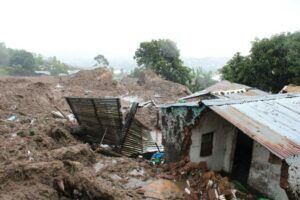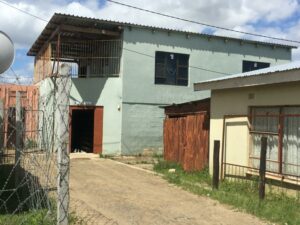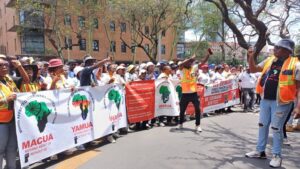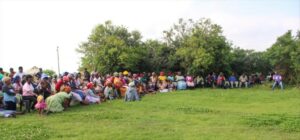
On Saturday, the fifth instalment of Ndifuna Ukwazi’s Land and Housing School convened at Community House in Salt River, Cape Town, to discuss housing issues and land reform.
Veteran journalist and author, Lebogang Seale in his address to the participants said the issue of land reform has been muted. “It’s sad that, during the recent elections, none of the political parties were vocal about the issue of land reform. So, one wonders what are the government’s plans when it comes to the issue of land reform. When your land is dispossessed, you’re stripped of your whole being. After we had our land forcefully taken, we thought the government that came to rule after 1994 would liberate us. But that has not been the case, instead they are now in cahoots with white farmers, enforcing evictions; it is very sad,” Seale told the activists.
Women are being marginalised
Seale decried patriarchy and said women, especially those working on farms continue to bear the brunt of exploitation. “Women are seen as the cheapest form of labour. In farms, women are the most exploited and because of patriarchy, their voices are the most marginalised. The government is not doing enough to address the plight of women. They bear the brunt of exploitation and we don’t speak enough about that and on their behalf. The government is found wanting when it comes to the issue of restoring their dignity,” said Seale.

Delving deep into his book, titled One Hundred Years of Dispossession: My Family’s Quest to Reclaim Our Land, Seale said they did everything required by law to get their family land which was taken from them, but they could not win.
His book is an in-depth account of how South Africa’s land reform policy has failed his family. “The government has dismally failed the land reform project. Land reform in South Africa is dead. Black people are also being marginalised to sour divisions among them. I hope we can establish an umbrella body that will stand up for the interests of farm workers and the people dispossessed of their land,” Seale said.
His family got their land forcefully taken from them over 100 years ago. “When our land was dispossessed, people were rendered weak and forcefully evicted. Having land gives you identity, sanctity and a sense of belonging. Without land, you are a vulnerable person. Land dispossession was very brutal and emotional,” said Seale. All he wishes for is to see elderly, who have been waiting for long, finally receiving the land.
Housing and food crisis
Tini Mohau from Indibano Yabahlali, a Khayelitsha-based civic organisation, criticised the way housing is distributed in the Western Cape. He doubts the existence of the housing waiting list. “There is always talk about a waiting list, but no one has actually seen this waiting list. There are the elderly and some people with disabilities who applied for houses a long time ago, but when you look at distribution
– most building projects are largely occupied by young people. For example, there is a housing project called Sandton in Khayelitsha, if you go there you find mostly young people in the houses. But if you can check the housing waiting cards, elderly people who applied long ago still don’t have houses,” said Mohau.
He said this invites a question of who is supposed to get housing in the Western Cape and who is not eligible. “I have also noticed that the housing system seems to be focusing mostly on people who stay in informal settlements and forget those who are backyard dwellers. People from informal settlements are always seen as people who want to jump the queue. It’s one of the excuses that government officials use around the Western Cape,” Mohau told Elitsha.

Access to a decent house is very important for any person’s well-being. “Having a decent home, changes even the way someone behaves and how they do things. You don’t need to always worry even when it rains about how it’s going to leak and all that. In an informal settlement you always know that when it rains you must be ready for disaster. Decent housing plays a very vital role, and gives one a sense of responsibility,” said Mohau.
He said as Indibano Yabahlali, they also are focused on issues around unemployment, and encouraging people to start their own community gardens as food prices keep soaring. “Food is becoming very expensive, vegetables are also becoming expensive. 7,5 kg of potatoes costs R100, which is ridiculous. So having these community gardens and assisting young people by connecting them to opportunities will help them. Yes, you may get a house at some point, but what’s next if you’re unemployed, how are you going to sustain yourself?” said Mohau.
On the issue of land and access, Mohau said people are now tired of talking and it is time to move to action. “People want practicality and are tired of the talks. We have been fighting for land. People have no choice sometimes due to the lack of knowledge.We can meet in these spaces and talk about these things but people want practicality. We need to practise the things we always speak about.”
Advocacy officer at the Social Justice Coalition (SJC), Bonga Zamisa, said the SJC has always taken a strong stance against evictions, knowing the devastating impact that forced removals have on communities. If a court grants an eviction order, the applicant by law must ensure that alternative accommodation is provided to avoid displacing people into conditions that strip them of basic dignity and security. But there is no political will in government to implement progressive laws that will protect vulnerable people against these injustices, Zamisa said: “The City of Cape Town has even returned funds allocated for housing and infrastructure back to the treasury, which demonstrates a troubling lack of commitment. True political will would prioritise the needs of the poor and marginalised by actively allocating and utilising resources for housing development.”
He added that the lack of access to decent, affordable housing severely affects the quality of life for working-class people. “It exacerbates poverty, limits access to basic services, disrupts social stability, and can even lead to negative health outcomes. Housing must be considered not just as shelter but as a means to ensure safety, stability, and equality,” he told Elitsha.





